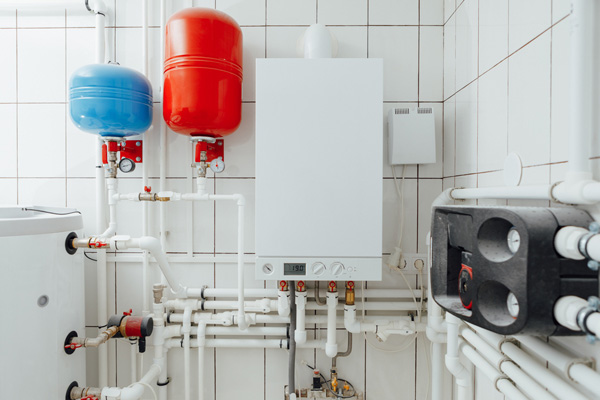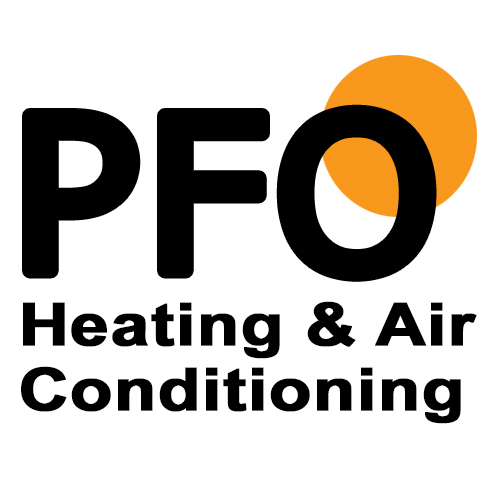
Selecting the optimal boiler is critical to achieving efficient heating. The market offers a diverse range of boilers, each with unique features, making it vital to grasp these distinctions to choose wisely. Understanding the differences between condensing vs. non-condensing boilers is essential for making an informed decision. PFO Heating & Air Conditioning is a leader in HVAC solutions, providing professional advice and exceptional service.
This article is designed to inform homeowners and businesses about the critical differences between condensing and non-condensing boilers, guiding you toward the ideal boiler for your requirements. Join us as we explore the boiler landscape and learn how PFO Heating & Air Conditioning can help you make the most informed heating choice for your home or office.
Fundamentals of Boilers
Contents
- 1 Fundamentals of Boilers
- 2 Comparative Analysis: Condensing vs. Non-Condensing Boilers
- 3 Making the Right Choice for Your Heating Needs
- 4 Boiler Maintenance & Care Tips
- 5 Tips for Prolonging Boiler Life & Maintaining Efficiency
- 6 Condensing vs. Non-Condensing Boiler FAQs
- 6.1 What Installation Considerations Are There For Condensing Boilers?
- 6.2 How Do Operating Costs of Condensing Boilers Compare to Non-Condensing Boilers?
- 6.3 Are There Any Special Maintenance Requirements for Condensing Boilers?
- 6.4 Can Existing Radiator Systems Work with Condensing Boilers?
- 6.5 How Do Condensing Boilers Compare to Non-Condensing Boilers in Terms of Environmental Impact?
- 7 Conclusion
- 8 Call PFO Heating & Air Conditioning for Premier HVAC Services

Boilers are the central component of numerous heating systems, delivering essential warmth to residential and commercial settings. At its core, the boiler functions by heating water or other fluids generating steam or hot water for heating purposes. This heated fluid circulates through systems such as radiators or underfloor heating to evenly distribute heat across different areas
The development of boiler technology marks a path of continuous innovation and enhancement. The transformation has been remarkable, from the rudimentary coal-fired boilers of the past to today’s advanced, energy-efficient models.
This progression has been fueled by improvements in materials, design techniques, and technological innovations, resulting in heating solutions that are not only more effective but also safer and more eco-friendly. As we delve into the specifics of condensing and non-condensing boilers, it’s important to view each as a milestone in this persistent journey of technological progress.
Understanding Non-Condensing Boilers
Non-condensing boilers represent a conventional approach to heating, operating by burning fuel to heat water. This process emits hot flue gases expelled through a chimney, leading to heat loss. Contrary to condensing boilers, these systems do not recapture and reuse the heat, resulting in lower efficiency.
Common types include conventional boilers, which are ideal for homes with high water demands because they have a separate hot water cylinder and storage tank; system boilers, which integrate components for space efficiency; and combi boilers, which provide heating and hot water directly and are suitable for smaller spaces.
These boilers are favored for their simplicity, easy maintenance, and cost-effectiveness, especially in older structures. However, they offer lower energy efficiency (typically 80-90%), which can result in increased operational expenses and a larger environmental footprint compared to condensing boilers. PFO Heating & Air Conditioning advises weighing these factors alongside personal requirements and the potential long-term advantages of opting for a more efficient boiler.
Maximize your heating system’s efficiency by booking a maintenance appointment with PFO Heating & Air Conditioning. Call us today!
Exploring Condensing Boilers
Condensing boilers represent a contemporary and highly efficient boiler category. They distinguish themselves by capturing and reutilizing heat from the water vapor in exhaust gases, a capability not found in non-condensing boilers. This process enables them to reach 90% or higher efficiencies, which translates to more effective fuel-to-heat conversion. The design of condensing boilers includes a condenser and a secondary heat exchanger, which facilitate this enhanced efficiency.
Despite the initial higher cost and possible requirements for property adjustments like installing a new flue system, the long-term advantages of condensing boilers are substantial. They not only help in lowering energy expenses but also minimize environmental harm by releasing fewer greenhouse gases. PFO Heating & Air Conditioning recommends considering these aspects in conjunction with your specific heating needs and the current configuration of your system. This way, you can assess whether a condensing boiler is the appropriate choice for your situation.
Comparative Analysis: Condensing vs. Non-Condensing Boilers

Understanding the differences between condensing and non-condensing boilers is crucial for making an informed decision about your heating system.
Non-Condensing Boilers
Non-condensing boilers are ideal for areas with low water pressure or properties that need simpler installations. They are more affordable initially and easier to install, particularly in older buildings. These boilers typically achieve 80-90% efficiency, with some heat lost through flue gases. While they are simpler to maintain, their lower efficiency results in a higher environmental footprint.
Condensing Boilers
Condensing boilers are ideal for those who prioritize energy efficiency. Suitable for various climates, these boilers achieve over 90% efficiency by capturing heat from exhaust gases. Although they come with a higher initial cost and may need more extensive installation and maintenance, they are more cost-effective over time and environmentally friendly, producing fewer greenhouse gas emissions.
Both boiler types provide comparable lifespans and durability. PFO Heating & Air Conditioning can assist you in determining the best option based on your local conditions and specific requirements.
Making the Right Choice for Your Heating Needs
Selecting the appropriate boiler for your property involves considering factors like building size, climate, and budget. Larger areas generally need a more powerful boiler, and in colder climates, an efficient system like a condensing boiler can offer long-term cost savings. Understanding the differences between condensing vs. non-condensing boilers is crucial, as condensing boilers have higher initial costs, but their efficiency can lead to significant savings over time.
PFO Heating & Air Conditioning guides you through the boiler selection process by assessing your property’s size, insulation, heating requirements, and local climate conditions. Our specialists conduct a thorough cost-benefit analysis to ensure that the boiler you select aligns with both your current budget and long-term financial objectives.
With PFO Heating & Air Conditioning’s professional expertise, selecting the correct boiler is simplified and personalized, guaranteeing maximum comfort and efficiency for your home or business.
Boiler Maintenance & Care Tips
Regular maintenance is critical to keep your boiler, whether condensing or non-condensing, running efficiently and prolonging its lifespan. Here are some essential guidelines and tips:
- Annual HVAC Servicing: Schedule a yearly service with a qualified technician, such as those from PFO Heating & Air Conditioning. This comprehensive checkup involves cleaning, inspecting, and testing all components to ensure they function correctly.
- Check the Boiler Pressure: Regularly check the boiler’s pressure gauge. Low pressure may suggest leaks or other problems, while high pressure can place undue stress on your boiler system.
- Inspect for Heater Leaks: Frequently check around and beneath the boiler for any signs of water leaks, as these can indicate underlying issues.
- Keep Vents and Flues Clear: Make sure all vents and flues are clear of any blockages to ensure correct airflow and efficiency.
- Monitor for Strange Boiler Noises: Be attentive to any unusual sounds coming from the boiler, as these can signal issues such as air in the system or scale buildup.
Don’t let a faulty HVAC system disrupt your comfort—call PFO Heating & Air Conditioning for prompt and reliable repairs.
Tips for Prolonging Boiler Life & Maintaining Efficiency

To make sure your boiler runs smoothly and efficiently for years to come, follow these essential maintenance tips:
- Bleed Radiators: Bleed your radiators yearly to remove trapped air, which can hinder heating efficiency.
- Maintain Water Quality: Ensure the water in your boiler is clean and free of impurities. Hard water can lead to scale buildup, lowering efficiency, so consider using a water softener if necessary.
- Insulate Pipes: Insulate your boiler’s pipes to minimize heat loss and prevent freezing during colder months.
- Upgrade Thermostats and Controls: Upgrade to smart thermostats and programmable controls for more efficient boiler operation.
- Regular Cleaning: Maintain cleanliness in the boiler and its surrounding area, ensuring it’s free from dust and debris.
PFO Heating & Air Conditioning provides comprehensive maintenance services and customized guidance for your boiler model. Consistent maintenance enhances your boiler’s longevity and ensures maximum efficiency, allowing you to reduce energy expenses while keeping your space comfortably warm.
Condensing vs. Non-Condensing Boiler FAQs

Here are some frequently asked questions and answers to help you understand the differences between condensing and non-condensing boilers:
What Installation Considerations Are There For Condensing Boilers?
Condensing boilers have specific installation requirements due to their need to manage condensate and potential alterations to flue configurations. It’s crucial to consult a professional to fully understand these requirements and confirm that your property is suitable for a condensing boiler installation.
How Do Operating Costs of Condensing Boilers Compare to Non-Condensing Boilers?
Although condensing boilers have a higher initial price, their superior efficiency can result in substantial energy savings over time. These savings can help balance out the initial higher expense through lower energy bills, particularly in colder regions with greater heating needs.
Trust PFO Heating & Air Conditioning to keep your HVAC system running smoothly—book your service appointment today.
Are There Any Special Maintenance Requirements for Condensing Boilers?
Condensing boilers have unique maintenance needs due to their intricate components, such as the condenser and secondary heat exchanger. Routine checks and maintenance performed by a certified technician are crucial to maintain optimal performance and address potential issues with condensate drainage and flue integrity.
Can Existing Radiator Systems Work with Condensing Boilers?
Yes, condensing boilers can usually be integrated with existing radiator systems. However, to fully leverage the efficiency benefits of a condensing boiler, it may be necessary to evaluate and potentially upgrade some components of the radiator system.
How Do Condensing Boilers Compare to Non-Condensing Boilers in Terms of Environmental Impact?
Condensing boilers are more eco-friendly than non-condensing boilers because they convert a higher percentage of fuel into usable heat, reducing their carbon footprint. By trapping and reusing heat that would otherwise be lost, condensing boilers also lower greenhouse gas emissions, making them a more sustainable heating option.
Conclusion
Deciding between a condensing and a non-condensing boiler requires a clear understanding of their cost, efficiency, environmental effect, and suitability for your specific needs. Condensing boilers provide higher efficiency and environmental advantages, while non-condensing boilers are valued for their simplicity and lower upfront cost.
Understanding the differences between condensing vs. non-condensing boilers is essential to consider long-term savings and compatibility with your heating requirements. For personalized advice and comprehensive solutions, contact PFO Heating & Air Conditioning. Our expertise will help you make the best, most informed decision for your heating needs.
Call PFO Heating & Air Conditioning for Premier HVAC Services
PFO Heating & Air Conditioning delivers top-quality heating and cooling services in Greater Princeton, NJ. Our professionally certified technicians specialize in HVAC tune-ups, repairs, installations, replacements, and more, ensuring your system runs perfectly.
We offer competitive prices for our HVAC services and provide maintenance that enhances comfort, boosts energy efficiency, and reduces costs. We recommend the best options within your budget if you need repairs or a new system. A satisfaction guarantee backs all our work. Schedule your service appointment today with PFO Heating & Air Conditioning. We offer free in-home estimates. Call now!
Click here to contact us now or call us at (800) 253-9001 to find out more! Click the link to view our service area.

Related Articles:



